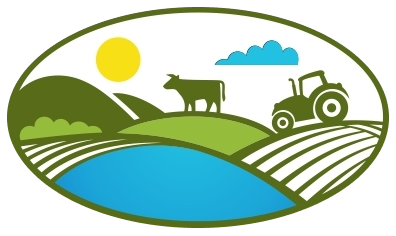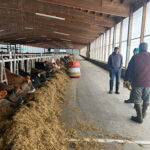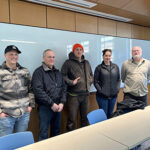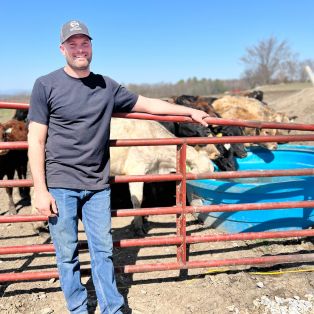
Ramsay Mellish is an organic farmer at Cutting Hill Beef Company in Cornwall, which he co-owns and operates with his wife Caroline. In 2022, Ramsay became a member of the Champlain Valley Farmer Coalition and, in January 2023, was elected to the Board of Directors.
In the not too distant past, Ramsay Mellish was a typical college student desperate for money.
What is perhaps less typical is the job he found to help make ends meet: Relief milker at a dairy farm near his university.
It wasn’t long before Ramsay became deeply interested in the science of dairy, and traded in the ivory towers for metal silos.
That’s right: he dropped out of college, became a farmer, and never looked back.
Ramsay worked for three years on that farm before moving with his wife, Caroline, to Newport, Vermont. There they rented a barn with a herd of 50 conventional cows, whose milk they sold to the St. Albans Co-op. They soon purchased a herd of 50 organic cows in a barn down the road, and sold their milk to Organic Valley.
If you’re scratching your head as much as the author of this story, then you’ll be relieved to know that this arrangement of farming conventionally and organically at the same time lasted only a year. They transitioned their conventional heifers to organic, sold off the conventional herd, and purchased more organic cows. One method of farming at a time, please and thank you!
April 2016 brought Ramsay and Caroline to Addison County, where they purchased John and Lisa Roberts’ Butterwick Farm in Cornwall. They milked exclusively for five years under a contract with Stonyfield.
Unfortunately, when they renegotiated their contract in 2021, it was for a lower price. In order to make up for the lost revenue, they expanded their milking herd from 120 to 180, and started growing organic vegetables at a nearby farm.
This opened the Mellishes’ eyes to the benefits of direct marketing. As one might imagine, it’s a lot of work to build relationships with co-ops and grocery stores. But once you’ve got a boot in the door, it’s much easier to sell them other products.
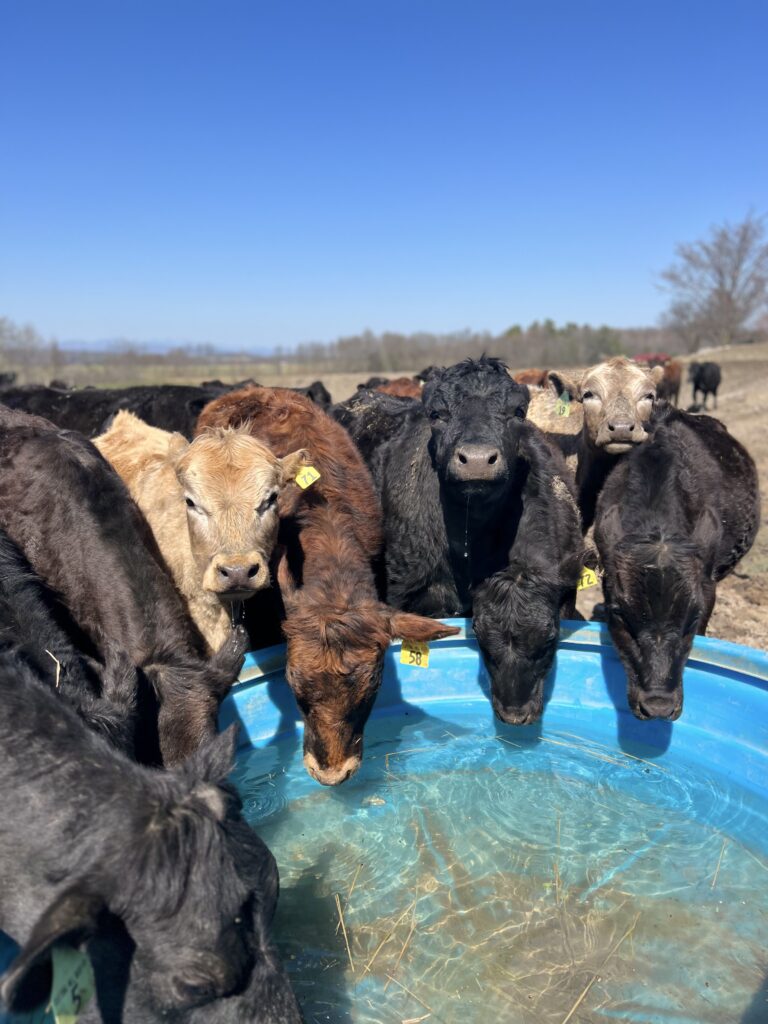
And that’s how it has come to pass that Ramsay and Caroline’s organic dairy is now known as Cutting Hill Beef Company. They started breeding a portion of their milk herd to beef. They’ve now raised hundreds of cows, selling their meat from Vermont to Rhode Island and everywhere in between.
Ramsay and Caroline have no plans to stop there with diversification. They are now raising a flock of 1,000 hens for eggs, and hope to grow to 3,000 by fall 2023. They also have a small drift of pigs mostly for personal consumption, but you can count on finding their retail pork in the near future.
“What we’re doing currently is a big experiment,” Ramsay explains of their multi-species venture.
He is not simply referring to their goal of growing and diversifying their revenue, however.
“As dairymen, we talk about multiple species in our hay, our perennial fields all the time,” Ramsay observes. “But many people don’t consider multiple species of animals, or even multiple species of ruminants, within the same system.”
He adds, “There’s really interesting diversification ideas that happen at small scales and it’s never implemented at a larger scale.”
And so, Ramsay and Caroline are wondering: What are the environmental and economic benefits of raising multiple animal species on the same parcel of land? Can it be done at scale in an effective way?
They believe it can.
“We know that the pastures benefit from having both ruminants and monogastric animals because of the difference in their manure. We know, too, that grazing even different ruminant species within the same pasture impacts the soil ecosystem differently than just one species,” Ramsay explains.
How? Cattle manure is lower in nitrogen and higher in other nutrients, while monogastric manure is higher in nitrogen and lower in other nutrients. Taken together, this creates a balanced diet for the soil.
“We can get the nitrogen basically paid for by the sale of the product from the monogastric animal, whether it’s pork or eggs,” he points out. “If it can be scaled big enough, then you have an excess of these nutrients you can spread on your hay fields.”
As organic farmers, the Mellishes are unable to spread synthetic fertilizers; they must rely on the manure their animals create.
“We can buy in chicken manure for nitrogen, which is a common practice,” Ramsay explains, “But it has its limitations. It’s more expensive than it used to be, and you’re at the mercy of poultry producers and what they are able to provide.”
There are research-backed benefits to the animals, as well, when there are multiple species on the same land.
“Small ruminants are susceptible to certain types of parasites that cattle are not. And cattle are susceptible to certain types of parasites that small ruminants are not,” Ramsay says. “When you put them in the same pasture, you confuse the parasites and they leave.”
Beyond their multi-species experiment, Ramsay and Caroline use many of the same environmentally friendly agriculture practices as other farmers.
They plant cover crops on plowed ground. The drill seed into perennial grasses. And they frost seed, broadcasting seed during early spring when the ground frequently freezes and thaws, which reduces the need for tilling.
They fence livestock out of Bascom Brook, which runs through the middle of their farm, and other waterways. And they use riparian buffers, vegetated strips of land that protect bodies of water from the impact of adjacent land uses.
In the future, Ramsay and Caroline plan to grow multi-species stands of small organic grains that can all be planted and harvested at the same time, such as rye, wheat, and barley varieties. These grains would be used to feed their chickens and pigs.
It’s at this point in the conversation that Ramsay reveals he has not fed grain to his cows in more than a year.
And why’s that?
“It’s too expensive,” he says with a laugh before quickly adding, “But I don’t know if it’s a good idea. Everybody says they get too skinny. While they are thin, their health markers suggest they’re extremely healthy. Reproduction is good. Hoof health improved substantially.”
The downside?
“Milk production really suffers,” he admits. “Cattle are fascinating because they can eat anything, but what is actually good for them to consume?”
Now there’s another question for the Mellishes to ponder and experiment with!
Like all of the farmers we’ve chatted with as part of our Featured Farmer series, Ramsay and Caroline are keenly aware of their environmental stewardship responsibilities.
“As farmers, we have a huge impact on the environment. Farmers are essentially responsible for managing hundreds of thousands of acres in Vermont, and we need to be mindful of that,” Ramsay observes.
That’s one of the reasons why he decided to join the Champlain Valley Farmer Coalition in December of last year and become a board member in January.
“As the older generation transitions out of their careers, those of us on the front-end of our careers need to step up to ensure organizations like the Coalition can keep going.”
Keep an eye–and an ear!–out for Ramsay and Caroline Mellish. They will be one of many important voices in Vermont agriculture for decades to come.
To learn more about Cutting Hill Beef Company, visit them on the web, or follow them on Instagram.
